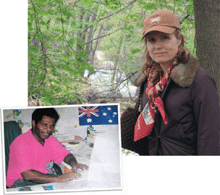
MURDER HE WROTE? Yours truly, Rhonda R. Shearer as depicted in Science magazine, alongside, former Papua New Guinea (PNG) World Wildlife Fund employee and indigenous person Daniel Wemp. Jared Diamond claims in his dramatic tale published by The New Yorker last year, that Wemp was a blood "thirsty" "killer" responsible for organizing "about 30 killings" during 1992-1995 -- an account for which Wemp served as his sole, unverified source.
(Read the Associated Press report for a good summary of the controversy regarding the charges of inaccuracy by iMediaEthics and the Handa and Ombal tribesmen, Hup Daniel Wemp and Henep Isum Mandingo, who are now suing Diamond and The New Yorker for libel in the New York State Supreme Court).
Diamond’s primary source, Wemp, denies both the factual claims and quotations Diamond attributes to him. Even journalists reporting on far more trivial matters than capital crimes fastidiously corroborate their information: they call this fundamental practice the “two-source rule.”
The sad truth is, however, using one source to detail the unpublished history of Papua New Guinea tribal warfare when your source is not a historian but your paid employee/driver, is hardly “good practice” for a UCLA freshman, let alone a UCLA full professor and scientist with multiple awards.
Diamond told Balter (emphasis mine) that he “confirmed that some of the people Wemp named had been involved in a tribal war” with “some younger members of his [Wemp’s] tribe” but makes no mention of checking with these other Handa about other facts, such as numbers people killed, dates, tribal names or locations. (The lack of verification is why Diamond’s essay is riddled with errors, such as mistakenly referring to villages as tribes or calling Henep Isum Mandingo an Ombal when he is a Henep tribesmen. See our 10,000-word report on iMediaEthics).
“ ‘The complaint has no merit at all,’ Diamond told Balter who interviewed Diamond for Science in “his office at the University of California, Los Angeles, where he is a professor of geography.” The key defense for Diamond was that he took lots of “detailed notes” during the May 2006 interview that he had with Wemp. (The New Yorker fact checker, Chris Jennings, said these were the only notes provided by Diamond).
The Society of Professional Journalism’s (SPJ) Code of Ethics states: “Test the accuracy of information from all sources and exercise care to avoid inadvertent error.”
Reporting on a war requires, at the very least, testing facts with sources from both sides. Diamond admits, without apology, that he spoke only to Handas (Daniel and some unnamed “younger members” not sourced in the original New Yorker report) and no Ombals, who he wrongly describes as enemies of long standing.





